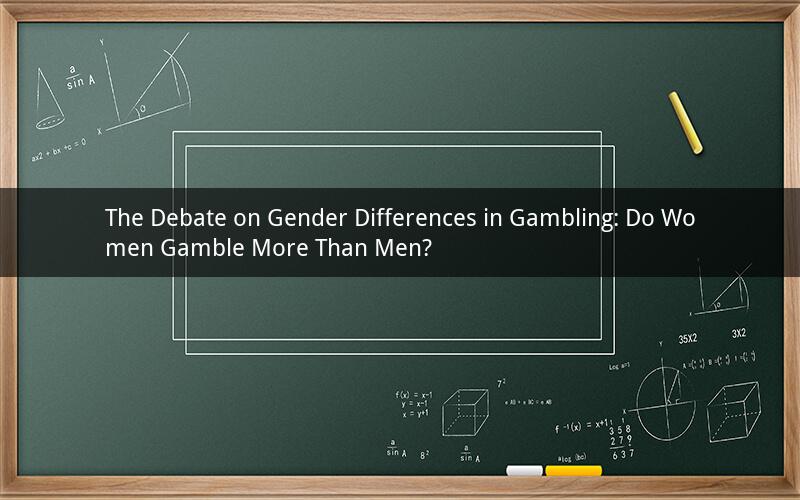
Introduction:
The topic of gender differences in gambling has been a subject of debate for years. One common question that arises is whether women are more prone to gambling than men. This article aims to explore the various perspectives on this issue, examining the factors that contribute to gender disparities in gambling behavior and discussing the potential reasons behind them.
1. Factors Contributing to Gender Differences in Gambling:
a. Psychological Factors:
Research suggests that psychological factors play a significant role in gambling behavior. Women may be more susceptible to certain psychological triggers, such as stress, anxiety, and depression, which can lead to increased gambling activity. On the other hand, men may be driven by factors like the desire for thrill or the need to prove their masculinity.
b. Social and Cultural Influences:
Societal norms and cultural expectations can also contribute to gender differences in gambling. In some cultures, women may be discouraged from engaging in gambling activities due to stereotypes and traditional gender roles. Conversely, men may be encouraged to participate in gambling as a form of entertainment or social activity.
c. Economic Factors:
Economic factors, such as income levels and access to resources, can also influence gambling behavior. Women may have limited financial resources or face financial constraints that prevent them from engaging in gambling activities. In contrast, men may have more disposable income or easier access to gambling venues.
2. The Role of Technology:
The rise of online gambling platforms has made gambling more accessible to both men and women. However, research indicates that women may be more likely to engage in online gambling compared to men. This could be attributed to the convenience and anonymity offered by online platforms, which may attract women who are hesitant to participate in traditional gambling settings.
3. The Impact of Marketing and Advertising:
Marketing and advertising play a crucial role in shaping gambling behavior. Studies have shown that women are often targeted by gambling advertisements, which may contribute to their increased participation in gambling activities. These advertisements may exploit stereotypes and portray gambling as a form of entertainment specifically for women.
4. The Importance of Education and Awareness:
Education and awareness campaigns are essential in addressing gender disparities in gambling. By promoting responsible gambling practices and providing information on the potential risks associated with gambling, individuals of all genders can make informed decisions. This can help reduce the likelihood of excessive gambling behavior and mitigate the negative consequences.
5. The Need for Further Research:
While there is evidence to suggest that women may engage in gambling more than men, further research is needed to fully understand the complexities of gender differences in gambling. This includes examining the individual, social, and environmental factors that contribute to gambling behavior and developing targeted interventions to address these disparities.
Questions and Answers:
1. Q: Do women experience different consequences from gambling compared to men?
A: Yes, research indicates that women may experience different consequences from gambling, such as increased financial stress, relationship problems, and mental health issues. These consequences can vary depending on individual circumstances and the severity of gambling behavior.
2. Q: Can gender differences in gambling behavior be attributed solely to psychological factors?
A: No, gender differences in gambling behavior cannot be solely attributed to psychological factors. Social, cultural, economic, and technological factors also play significant roles in shaping gambling behavior.
3. Q: Are there any specific gambling activities that women are more likely to engage in compared to men?
A: While there is no definitive answer, some studies suggest that women may be more likely to engage in certain gambling activities, such as bingo, slot machines, and online gambling. However, this may vary depending on cultural and individual preferences.
4. Q: Can gender differences in gambling behavior be changed through public awareness campaigns?
A: Yes, public awareness campaigns can play a crucial role in addressing gender differences in gambling behavior. By promoting responsible gambling practices and providing information on the potential risks, individuals of all genders can make informed decisions and reduce the likelihood of excessive gambling.
5. Q: How can society support individuals who struggle with gambling addiction, regardless of gender?
A: Society can support individuals with gambling addiction by providing access to treatment and support services, raising awareness about the issue, and promoting responsible gambling practices. This includes implementing policies that protect vulnerable populations and addressing the root causes of gambling addiction.